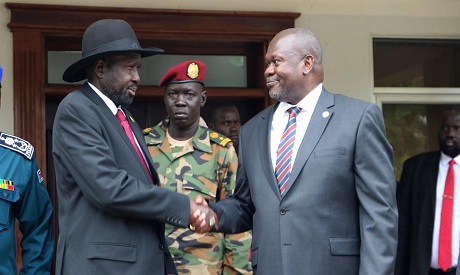
Salva Kiir and Riek Machar (File Photo: Reuters)
South Sudan's fragile government and the peace agreement that formed it are in jeopardy after the country's president and vice president disagreed on how to share out regional states between them.
South Sudan ended five years of civil war in 2018, but conflict between President Salva Kiir and Vice President Riek Machar -- who led the opposing sides in the war -- have been major obstacles to completing the peace process.
The two disagree over who will run South Sudan's states and how to integrate different fighting forces. On Thursday, Kiir's office announced that leadership of six of the 10 states would go to Kiir's side, three would go to Machar's side and one would go to an alliance aligned with neither Kiir nor Machar.
"The allocation of the states ... is that of the president and not a decision taken by consensus," Machar said in a statement on Friday. "It does not take into consideration the relative prominence each party has in each of the respective states or counties."
Calls to Kiir's spokesman, Ateny Wek Ateny, for comment went unanswered.
Alan Boswell, a senior analyst with Brussels-based think tank International Crisis Group, said the disagreement between Kiir and Machar endangered the gains made so far toward a lasting peace.
"South Sudan’s new unity government is facing its biggest crisis yet, as negotiations broke down on how to share power in state and local governments across the country,” he said in a statement.
"Despite the attention of South Sudan’s international partners on the COVID-19 pandemic, quick action from regional leaders will be key so that this latest power squabbling doesn’t escalate."
South Sudan's civil war, often fought along ethnic lines, claimed an estimated 400,000 lives, triggered a famine and created Africa's biggest refugee crisis since the 1994 genocide in Rwanda.
Short link: